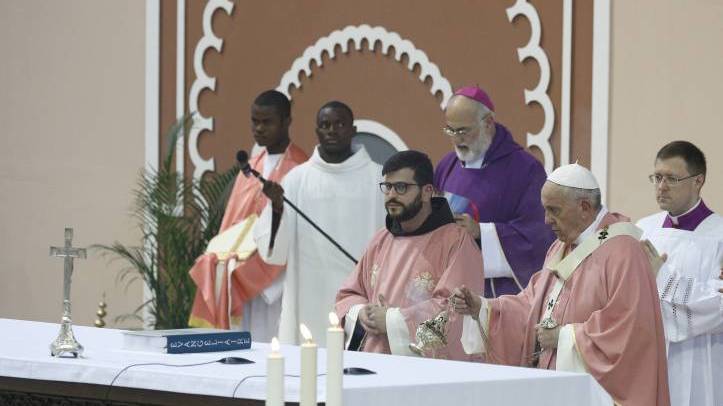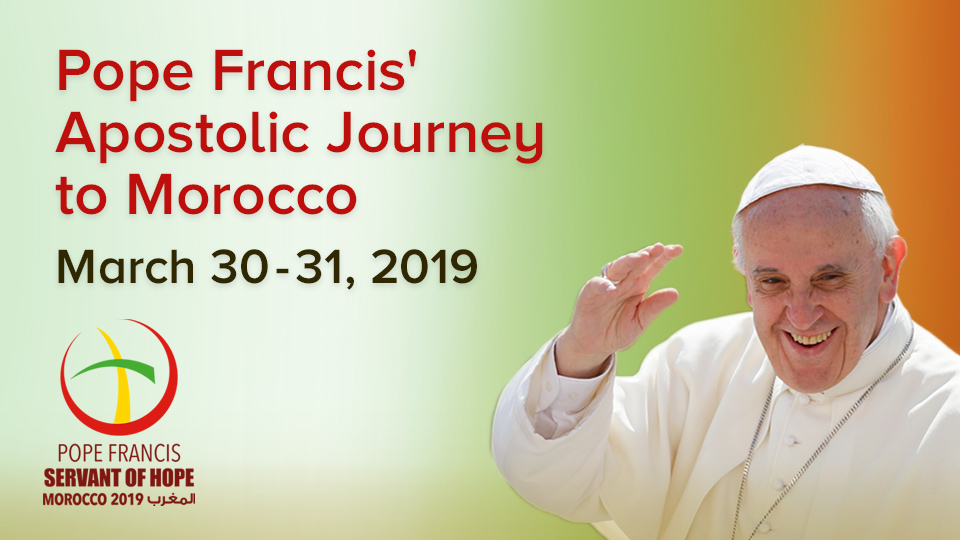

Pope Francis' Homily at Rabat Mass
Salt + Light Media
Sunday, March 31, 2019

CNS photo/Paul Haring
On Sunday, March 31, 2019 - the second and last day of his Apostolic Journey to Morocco - Pope Francis celebrated Sunday Mass at Prince Moulay Abdellah Sport Centre in Rabat. Below is the full text of the pope's homily on the parable of the prodigal son and the ever abundant mercy of our Heavenly Father:“While he was yet at a distance, his father saw him and had compassion, and ran and embraced him and kissed him” (Lk 15:20). Here the Gospel takes us to the heart of the parable, showing the father’s response at seeing the return of his son. Deeply moved, he runs out to meet him before he can even reach home. A son long awaited. A father rejoicing to see him return. That was not the only time the father ran. His joy would not be complete without the presence of his other son. He then sets out to find him and invites him to join in the festivities (cf. v. 28). But the older son appeared upset by the homecoming celebration. He found his father’s joy hard to take; he did not acknowledge the return of his brother: “that son of yours”, he calls him (v. 30). For him, his brother was still lost, because he had already lost him in his heart. By his unwillingness to take part in the celebration, the older son fails not only to recognize his brother, but his father as well. He would rather be an orphan than a brother. He prefers isolation to encounter, bitterness to rejoicing. Not only is he unable to understand or forgive his brother, he cannot accept a father capable of forgiving, willing to wait patiently, to trust and to keep looking, lest anyone be left out. In a word, a father capable of compassion. At the threshold of that home, something of the mystery of our humanity appears. On the one hand, celebration for the son who was lost and is found; on the other, a feeling of betrayal and indignation at the celebrations marking his return. On the one hand, the welcome given to the son who had experienced misery and pain, even to the point of yearning to eat the husks thrown to the swine; on the other, irritation and anger at the embrace given to one who had proved himself so unworthy. What we see here yet again is the tension we experience in our societies and in our communities, and even in our own hearts. A tension deep within us ever since the time of Cain and Abel. We are called to confront it and see it for what it is. For we too ask: “Who has the right to stay among us, to take a place at our tables and in our meetings, in our activities and concerns, in our squares and our cities?” The murderous question seems constantly to return: “Am I my brother’s keeper?” (cf. Gen 4:9). At the threshold of that home, we can see our own divisions and strife, the aggressiveness and conflicts that always lurk at the door of our high ideals, our efforts to build a society of fraternity, where each person can experience even now the dignity of being a son or daughter. Yet at the threshold of that home, we will also see in all its radiant clarity, with no ifs and buts, the father’s desire that all his sons and daughters should share in his joy. That no one should have to live in inhuman conditions, as his younger son did, or as orphaned, aloof and bitter like the older son. His heart wants all men and women to be saved and to come to the knowledge of the truth (1 Tim 2:4). It is true that many situations can foment division and strife, while others can bring us to confrontation and antagonism. It cannot be denied. Often we are tempted to believe that hatred and revenge are legitimate ways of ensuring quick and effective justice. Yet experience tells us that hatred, division and revenge succeed only in killing our peoples’ soul, poisoning our children’s hopes, and destroying and sweeping away everything we cherish. Jesus invites us, then, to stop and contemplate the heart of our Father. Only from that perspective can we acknowledge once more that we are brothers and sisters. Only against that vast horizon can we transcend our shortsighted and divisive ways of thinking, and see things in a way that does not downplay our differences in the name of a forced unity or a quiet marginalization. Only if we can raise our eyes to heaven each day and say “Our Father”, will we be able to be part of a process that can make us see things clearly and risk living no longer as enemies but as brothers and sisters. “All that is mine is yours” (Lk 15:31), says the father to his older son. He is not speaking so much about material wealth, as about sharing in his own love and compassion. This is the greatest legacy and wealth of a Christian. Instead of measuring ourselves or classifying ourselves according to different moral, social, ethnic or religious criteria, we should be able to recognize that another criterion exists, one that no one can take away or destroy because it is pure gift. It is the realization that we are beloved sons and daughters, whom the Father awaits and celebrates. “All that is mine is yours”, says the Father, including my capacity for compassion. Let us not fall into the temptation of reducing the fact that we are his children to a question of rules and regulations, duties and observances. Our identity and our mission will not arise from forms of voluntarism, legalism, relativism or fundamentalism, but rather from being believers who daily beg with humility and perseverance: “May your Kingdom come!” The Gospel parable leaves us with an open ending. We see the father asking the older son to come in and share in the celebration of mercy. The Gospel writer says nothing about what the son decided. Did he join the party? We can imagine that this open ending is meant to be written by each individual and every community. We can complete it by the way we live, the way we regard others, and how we treat our neighbour. The Christian knows that in the Father’s house there are many rooms: the only ones who remain outside are those who choose not to share in his joy. Dear brothers and sisters, I want to thank you for the way in which you bear witness to the Gospel of mercy in this land. Thank you for your efforts to make each of your communities an oasis of mercy. I encourage you to continue to let the culture of mercy grow, a culture in which no one looks at others with indifference, or averts his eyes in the face of their suffering (cf. Misericordia et Misera, 20). Keep close to the little ones and the poor, and to all those who are rejected, abandoned and ignored. Continue to be a sign of the Father’s loving embrace. May the Merciful and Compassionate One – as our Muslim brothers and sisters frequently invoke him – strengthen you and make your works of love ever more fruitful.

Related Articles:
Category: 香港教區, Highlight, Lent 四旬期 / Holy Week 聖週 / Easter 復活期
Tag: 2023, 周守仁主教, 四旬期, 四旬期牧函, 天主教香港教區
教宗良十四世與以色列總理通電話:呼籲各方重啟談判、促成停火並終結戰爭
Friday, July 18, 2025
 鹽與光
鹽與光
【鹽與光傳媒資訊】2025年7月18日,聖座新聞室發出公告表示,教宗良十四世於當天早上在岡道爾夫堡夏宮與以色列國總理內塔尼亞胡進行了電話通話。教宗再次呼籲各方重啟談判、促成停火並終結戰爭。
耶路撒冷拉丁禮宗主教與希臘正教耶路撒冷宗主教探望受襲教堂
Friday, July 18, 2025
 鹽與光
鹽與光
【鹽與光傳媒資訊】2025年7月18日,耶路撒冷拉丁禮宗主教區發出新聞公告,耶路撒冷拉丁禮宗主教皮扎巴拉樞機與希臘正教耶路撒冷宗主教德敖斐羅三世帶領教會代表團,於早上時間進入加沙,代表聖地教會表達對加薩信友的牧靈關懷與團結之情。
加沙天主教堂遇襲,教宗再次呼籲加沙停火
Thursday, July 17, 2025
 鹽與光
鹽與光
【鹽與光傳媒資訊】2025年7月17日,在以色列軍隊針對加沙聖家堂發動攻擊,造成三人死亡、數人重傷後,教宗良十四世(Pope Leo XIV)向當地信友表達關懷,並再次呼籲立即停火。根據加沙衛生部門的統計,自2023年10月7日以來,加沙戰爭已造成超過60,200人死亡,其中包含58,313名巴勒斯坦人與1,983名以色列人。同日,耶路撒冷拉丁禮宗教區也發出聲明嚴正譴責受襲擊事件。
美國加州主教為面臨被遣返風險的信友發出「主日彌撒義務豁免法令」
Wednesday, July 16, 2025
 鹽與光
鹽與光
【鹽與光傳媒資訊】美國加州聖貝納迪諾教區主教羅哈斯(Bishop Alberto Rojas)於2025年7月8日頒布法令,豁免面臨被遣返風險的信友履行主日彌撒義務。此前,移民官員於6月進入兩間天主教堂區,並拘捕了數人。
1
2
3
4
5
6
7
8
9
10
11
...
1401
>>
SUPPORT LABEL
$50
$100
$150
$250
OTHER AMOUNT
DONATE
Receive our newsletters
Stay Connected
Receive our newsletters

Stay Connected









